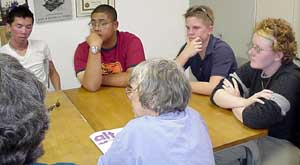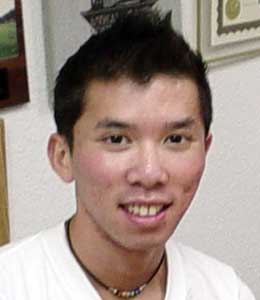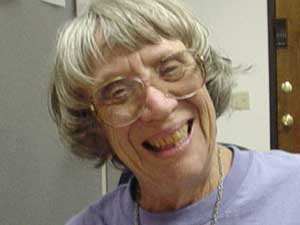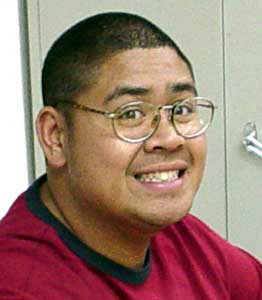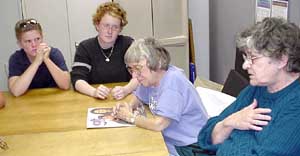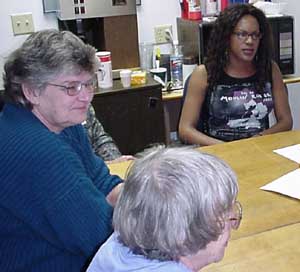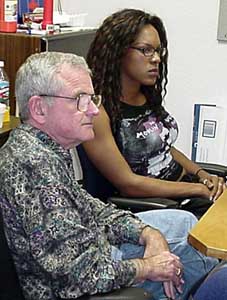-
- Federal raid on city council could affect gay vote
- Family Pride Coalition/Family Matters fundraiser exceeds expectations
- Human Dignity raises an estimated $95,000
- Community members gather for AIDS Candlelight Memorial
- Center Board to discuss, vote on background checks at May 27 meeting
- Community News
-
- Suspect arrested in killing of lesbian teen
- Slain soldier’s parents want to stall promotion of Army general
- Oregon students cancel blood drive to protest antigay policy
- Phony counseling service for transgender youth uncovered
- Episcopal seminary to award MCC founder honorary degree
- Delaware nondiscrimination bill resurfaces for second year
- Pensacola woman guilty of shooting lover at church
- Lutheran congregation installs lesbian pastor
- Exhibit celebrates anniversary of Pride flag
- Report says gay couples are more educated than married couples
- National News Briefs
- World News Briefs
feature
Bridging the gay generation gap
GLBT youth and seniors meet for a roundtable discussion
Published Thursday, 22-May-2003 in issue 804
It seems that any time two groups of differing ages don’t see eye to eye it’s blamed on the generation gap. The young think the old are stodgy, calcified, caught up in the past and unable to accept the present or see the future. The old think the young are shallow, thoughtless, disrespectful and immoral.
But is it true? Are the generations so separated by age and different experience that they cannot find common ground, or are they closer than they might think? The Gay and Lesbian Times recently gathered a group ranging in age from 17 to 66 to answer this very question.
The group did have a few things in common — they all identify as members of the GLBT community and are active within that community. Of course it’s hardly a scientific survey, but it brought up some interesting issues. In the end, it seems that both the younger and older generation feel that they have something to offer, as well as something to learn from each other.
Anyone who stops learning is old, whether at twenty or eighty. Anyone who keeps learning stays young. The greatest thing in life is to keep your mind young.
— Henry Ford
Many people think old age is a disease, something to be thwarted if possible. But someone has said that if any period is a disease, it is youth. Age is recovering from it.
— T. C. Myers
The first question we posed to our group was, “Does the generation gap really exist,” and the general consensus seemed to be yes … and no.
“I have a friend, about a year older than I am, who has a rainbow sticker on her bumper, and a little neighbor boy, about 10 years old, asked her why she had it on her car,” said Gloria Johnson, 66. “She explained to him that it was the rainbow flag and that she was a gay woman, and he looked at her and said, ‘Gay people are never as old as you are.’ So I think there is a perception out there that lesbians and gay people, transgender people, are young. They don’t realize that we get gray hair too.”
“It’s almost impossible to explain to someone of your generation what it was like to come out in 1954.... It’s like a whole different world.” — Jeri Dilno
“I think there is [a generation gap], but I don’t think it necessarily has to do specifically with gay people,” added Roxy Wood, 19, who currently identifies as a drag queen. “I’m in my teens, about to be 20 … and I think a lot differently in terms of what I’ve experienced in my lifetime than older people, but I think that we all have something to learn from each other.… There are young people, especially in the teenage years, that don’t want to hear what older people have to say, and at the same time, there are older people who have experienced a lot … and they don’t want to hear what younger people have to say because they think they’ve lived it all.”
Benjamin Ignalino, 24, thought that acknowledging age itself is a problem within the gay community. “When it comes to just the gay community, in general, age is shunned,” he pointed out. “To be older is to be shunned, and that is why you’ll see people in their 40s dying their hair and getting piercings and tattoos. They don’t want to feel old or they don’t want to look old because they don’t want to celebrate their age.… You see it on TV too. You don’t see an older, queer representative, you see 30 or 40 — and 40 is pushing it. I’ve never seen any queer representative of the older community other than what I saw in If These Walls Could Talk II.”
Six (Sasha) Cullen, 23, said both the younger and the older generations need to respect each other, adding that, “You really have to give [respect] to get it.
“I personally really see age and being old as a personality trait and what you believe yourself to be. You can be 103 and be young, in my opinion. But a complete [stranger] approached me in a lift one day and said, ‘Why do you young whippersnappers feel that you must stick metal in your face!’ I didn’t know this man from Adam. He just came up and started yelling at me.… But by the same token, I’ve encountered older generations who say, ‘Young people don’t respect us. We deserve respect,’ etc. etc.”
So do the generations respect one another? According to Johnson, it depends. She’s had a great time working with younger people at The Center, but she worries that, “so many young folks aren’t interested in registering to vote and taking part in the political process.”
The importance of history
Every time history repeats itself, the price goes up.
— John A. Appleman
If it is true that those who don’t know their history are doomed to repeat it, then any group that has had to struggle to gain a place in the world would surely make a point of passing that history from generation to generation. If anyone within the younger GLBT community would know the history of the GLBT struggle, it would be this unusually well informed, community-minded group. But it seems that this is an area in which we are failing the future. Everyone under 25 knew a little about Stonewall and some were familiar with Harvey Milk, but beyond that their knowledge of gay history was sparse. In all fairness, where would they have gained this knowlege? Certainly not in school.
“Generally speaking, I don’t think there’s much dialogue at all about our history,” said Loc Dinh, 22. “I certainly don’t know very much — there are the big events, but anything in between, and the people involved in the process, I don’t know. I know that the LGBT Center in LA had this big project where they got together LGBT youth and seniors and took black and white pictures and blew them up and put them up in the center and did focus groups in conjunction with that, and I thought it was great.
“Where we are now has very much to do with where we were five or 10 years ago,” Dinh continued. “The context in which the political arena is now has to do with the efforts of people five or 10 years ago, and if we don’t know that we may make some of the same mistakes. And if we don’t appreciate that then the movement kind of slows down, there’s no continuity.”
According to Tom Kirkman, 60, the older generation has a responsibility to teach the younger their history, while the younger generation has a responsibility to teach the older how things are changing.
“We’ve got four senior organizations in San Diego and I think we have a tremendous opportunity to pass on our history,” said Kirkman. “Having lived through it, this is something that we need to pass along to those behind us. I think it’s the responsibility of the senior organizations to perhaps do that, or at least be instrumental with that.
“I think we do have people in the community who can share our history, and I’m sure that the younger members of our community have a lot that they could share with us.… I have been amazed at the enthusiasm and the excitement that they have and their pride in who they are. They’re so proud and excited to tell you about it, and I think we have an obligation to them.”
“Not only do we have a history that’s important to save,… it’s important to look at political movements and social movements and analyze them and learn from them, to help us in the future — what worked, what didn’t work, how things are still relevant today,” added Cullen. “Personally, in the last 10 or 15 years, I’ve seen a huge change in the LGBTIQ community, as that acronym gets longer and longer.… I think what we consider under that umbrella has evolved and changed. As younger people, there are some of us who are very, very political and very active, and there are some who just don’t care. That’s common. We see it a lot at the Youth Center — there’s a group of us who do everything, and there’s a group of us who just sit there. You have an older generation who’s involved, and a part of it that’s not involved. We all make up that community. I think [we need] to get the non-involved people involved and to get the involved people talking and see how things have changed — possibly the older generation doesn’t understand as much how the umbrella has changed, with trans and bisexual people coming under the umbrella…. The concept of queer is larger and more ambiguous and I think there could be a lot of dialogue going on.”
Is being GLBT easy now?
Courage is to feel the daily daggers of relentless steel and keep on living.
— Douglas Malloch
The fact is that the GLBT community has changed drastically over the years. In some ways life as a member of the GLBT community is much easier that it used to be — there are safe places to go, there is a visible community growing in power, there are resources available, it is possible to live an open, happy life — but there are also challenges that simply didn’t exist years ago. AIDS wasn’t an issue before the early ‘80s and coming out as a youth has only recently become fairly common. If you’re openly GLBT in high school now, there is more to fear than being shunned, mocked, or even beat up.
“It’s almost impossible to explain to someone of your generation what it was like to come out in 1954 at San Diego State [University],” said Jeri Dilno, 66. “It’s like a whole different world, and to sit here today and look back on it, I almost can’t believe the changes in the attitude and even my own attitude and my feelings about myself.… I think the big difference is that you have resources. When I came out in 1954 … the woman that I was having a relationship with was able to convince me without any trouble at all that we were the only two lesbians in San Diego County,” she continued. “So even though I was in a relationship I was leading a very isolated life. Part of that was her own insecurity; she didn’t want to introduce me to even the limited lesbian social group that was available to us. And when I did, a couple of years later, find out there was a lesbian social group, it was still very covert. You’d go out and you wouldn’t even tell anybody your last name, much less your phone number or anything like that, so it was very difficult to gain any kind of trust. It took a long time.… That duality, that living a life of constant hiding, that’s the part I think is easier. Yes, you get rejected, people have terrible experiences with their family still, people get thrown out of the military still, but there are resources.”
“At my high school it’s very hard to be gay,” responded, Saranique Schwartz, 17. “There’s not an organization there and the people are not willing to start an organization there. The people there are very closed-minded and if you identify as a lesbian and you don’t make an attempt to hide who you are, they’re going to attack you and they’re going to make it known that they don’t like you and they want you to die.
“I think there’s a group [of older people] that thinks it’s just a whole lot easier, who think, ‘We had it hard and you have it easy now,’ and then there’s a group that realizes that the experience of coming out and not being sure who you are and what you are — there’s still that insecurity and that lack of connection in trying to figure out who you are and realizing there’s a whole community like you.”
“I was riding the bus about a year ago and I happened to see the high school and a bunch of young kids started yelling at this young boy, ‘Faggot, faggot, faggot,’ and it just really hit me that, wow, these kids are using this as a general attack on him,” added Johnson.
Marriage vs. domestic partnership
Defense of Marriage? It’s like the old V-8 commercial. As though if this act didn’t pass, heterosexual men all over the country would say, [smacking head] ‘I could have married a guy!’
— Barney Frank, U.S. Representative
There are a lot of assumptions about marriage. Often it is assumed that younger people don’t respect it, that they see it as a restrictive, overly religious institution that should probably be done away with entirely. That wasn’t the case with this group. They agreed that everyone should be allowed to make that choice for themselves, and the younger members seemed to like the thought of marriage best.
“I want to get married later on,” said Wood. “I think that we should be able to get married. I’ll tell you one thing that makes me really angry. They’ve got all these stupid shows … all these crappy shows about people trying to get married. And it makes me so angry that people who don’t even know each other can get married, legally married, on a TV show, but gay people can’t.
“I guess I’m right there where Roxy’s at,” Dinh agreed. “I can imagine Adam and Steve together for 15 years and owning a house together and having no legal protections whatever, and Jane and John know each other for five minutes and they can go to Las Vegas and within five minutes get married. And that’s insulting. It’s incredibly insulting. I really have to ask what values we’re promoting here.
“I think it’s about the legality,” continued Dinh. “If people want to get caught up on the religious implications, that’s perhaps different, but we’re talking about legal marriage, which is a political contract and doesn’t have anything to do with those other normative values. It doesn’t belong in our states.
“What amazes me is how we’re continually told that LGBT folks are dirty, nasty, pervasive, we engage in all these really bad activities, and they won’t give us the tools by which we can create, for those who want it, monogamous long-term relationships that are recognized by the state,” Dinh concluded. “So on one hand you say we’re doing one thing, but deny us the possibility of doing anything else. It’s completely illogical; it doesn’t make any sense.”
“I think there’s a variety of ways people choose to relate to each other, and I think The Netherlands has it right,” said Dilno. “They can either be domestic partners, they can have another level up, I think, or they can get married. And with each different step there are different responsibilities and benefits that one gets.
“I think the problem for us in the U.S. right now is that as GLBT people we don’t have the option to marry and thereby have access to all the rights and privileges that married people have,” she continued. “There are a lot of things that just automatically come to people who are married that people who are in a relationship of any other sort [don’t get].… I think it should be a kind of menu of what kind of relationship you choose to have, and that anybody can opt for whatever relationship works for them.”
“I think that AB205 [the Domestic Partnership Bill] is a step from where we are now, and I think any step up is a step that should be taken, but I don’t think it should appease anyone,” said Schwartz. “You have to keep climbing and hope for the best. In the end I think people need to have the choice whether they want a domestic partnership or whether they want to be married, and I think there should be no distinction between two straight people in a heterosexual couple having a domestic partnership or a marriage and two people in a homosexual couple having a domestic partnership or marriage. I think we should all have the same rights. I think that eventually we’ll get there.”
RE: being out
I am a big believer in the ‘mirror test.’ All that matters is if you can look in the mirror and honestly tell the person you see there that you’ve done your best.
— John McKay
Now that there is a growing GLBT presence among the larger community and many people resist categorizing their sexuality, pointing out that there’s more to their relationships than sex, how important is it to come out?
“It’s important to be out to others because there’s a witness value that we all have, said Kirkman. “I think we especially have a responsibility as older members of the community to be out and happy so that youth can say, ‘Oh, I can be happy in my old age too, and still be comfortable and interact with different people.’ I think it’s very important to the individual, when that person is ready to make that determination, to just do it. Don’t hold back. It’s healthy.”
“I would certainly agree with that,” Dilno responded. It’s a mental health issue, as far as I’m concerned. Having been both deeply, deeply closeted and living a double life, with the stress that causes, to now being totally open. And by totally open I don’t mean that you have to put a sign in your car window or have stickers or wear a T-shirt all the time, but that when you’re asked or when you’re interacting with people, that it’s just part of who you are.
“For so many years, part of the time I was so far in the closet I was hardly even out to myself, and then gradually I would be out — I’d have my social life and then my work life, and it was very compartmentalized,” she added. “This would be one section of my life and this would be another … and you would have to be very careful that you didn’t let them bump into each other, or somebody from this group would find out about that group. It’s crazy making. So I’m a proponent of being out — out to yourself is the most important thing. How you do that in the world should be comfortable to you.”
“I think it’s tremendously important to be out,” Johnson agreed. “One time somebody asked me who was the first person I told that I was coming out, and I said, ‘Well, myself,’ because as we were saying, that is where it has to start.”
The need for visible role models was a recurring theme.
“What I’ve learned from my experience of being out is that it’s a lifelong process,” said Ignalino. “Just because I’ve done it once doesn’t make it easier with the next person. Being out also is something that I do for myself, but [also] as a role model. I want to be a role model. I want other people to look up to me and say, ‘He is an Asian gay male, and I never saw that.’
“When I came out I didn’t know anybody who was my skin tone,” he continued. “All I saw on TV or heard from people using derogatory words was that it was a white male. I didn’t grow up knowing any Asian role models or any type of minority queers. When I looked at myself in my community I felt like such a minority. A lot of the youth today only have so many people to look up to because they identify with that person.”
“I don’t think there’s enough people [as role models],” Wood agreed. “I know there’s people in our community, but I’m a media person myself, and I want people that are seen worldwide to represent us, because we rarely see that. That’s my goal.
“I’ve kind of become a role model,” Schwartz said. “I’ve had people come out to me because when I first got there, there wasn’t anybody that was visibly out [at my school], and I guess I became that visibly out person. And even though I was still sort of searching for myself, I’ve become a sort of pillar for other people. It’s interesting, and I’m not sure that I was ready for it at the time, but I am now. ”
Spirituality
There remains something subtle, intangible and inexplicable. Veneration for this force beyond anything that we can comprehend is my religion.
— Albert Einstein
Religion is a traditional flashpoint for the GLBT community. It is often regarded as a major source of persecution, and leaves many scarred after contact with it. With religious types such as Jerry Falwell accusing gays and lesbians of causing the 9/11 disasters, and the ubiquitous Fred Phelps picketing funerals to tell people their dearly beloved is frying in hell, it’s no wonder that going to church isn’t listed among the top five favorite GLBT activities.
Still, individual beliefs aside, religions develop for a reason. It’s an unusual person who can take sole responsibility for their life without allowing for the possibility of something greater. So how do the different generations reconcile this dichotomy? In very similar ways.
“I think spirituality is more in how you define it,” was Dilno’s comment. “I think it’s an individual experience, an individual relationship that you have with whatever your spiritual higher being, or whatever you want to term that, may be.… It’s the way that you connect with people on that other plane.”
Dinh had a slightly different take on religion, but seemed to come to the same conclusion. “I take a look at the GLBT movement as a sociological movement, and I think we’re kind of at a point where we’re fighting for some of the higher ideals in terms of identity, political rights, civil rights. I think one of the sections that we, as a general movement, have kind of neglected is religion and spirituality. I don’t get a strong sense that the GLBT movement in general pushes us in that direction. I, for one, would like to see more of an effort in that direction.
“I’ve chatted with a lot of 30-something gay men who were raised with a particular religion and have turned their backs on it,” he continued. “That may be their individual experience, but I’ve met a lot of them. It seems unfortunate that we haven’t spent the time to renegotiate that. I would like to see some role models in that direction.”
“I grew up in a very conservative area,” Schwartz explained. “I felt very rejected by religion and I felt like I didn’t belong. My father came from a Mennonite family, which was even worse. When you show up in a Mennonite church with buzzed hair and pants on it’s just not acceptable. So in some ways I felt like I did not belong in that sphere, but at the same time I have done my own research and I’ve read on religion and read through philosophy on my own time because it interests me. Religion interests me; spirituality intrigues me. I find myself a very spiritual person and I don’t think the negative aspects of it have really pushed me away from spirituality as much as organized religion. I don’t think that’s necessarily a bad thing, because the more I come to understand myself I don’t find that the organized religion aspect of it is that necessary in my life.”
“The church that I used to go to wasn’t accepting,” Ignalino admitted, “but now that I go to a different church in Tierrasanta, it’s nice because you can walk in and there are older gay people who go to that church. You see the rainbow stickers on their cars and they just walk into church and they’re OK, no one really cares. When it comes down to it, it’s all about personal faith. They’re there for themselves and their god.… It wasn’t that I lost my religion, it’s that my religion lost me. They’re the ones that gave me up. But I was able to come to understand that it wasn’t about giving up, but about understanding and being able to move on past that.”
“From my point of view, the Catholic Church has always been conservative, is still conservative, but it was the faith that I was brought up in,” said Kirkman…. “I think I’ve gotten more spiritual after my experiences in organized religion. I find myself reading more about different religions now than I ever have been before…. I think there’s something I can learn from that. There has to be a spiritual base to that to be so powerful. I’m totally fascinated with Islam, and I need to read more about that, because it’s motivated a whole group of people to do something. There’s a power there, and I’d like to understand it…. But I went back to the Catholic Church through Dignity, because my Catholicism had a real solid base for me, personally. I was able to find that with others who were part of Dignity (a national organization for GLBT Catholics). So it actually became for me a supporting mechanism.”
Wood admitted to not being very religious, but was fascinated by the prospect of being able to attend an inclusive church.
“I’m not a real religious person, but, it just really makes me excited to know that there are churches out there [that are accepting],” he said. “I guess I’ve always wanted to attend a church, and just feel like I could go there and just be myself and all dressed up … in a nice little dress or something. You know, I mean I’d look presentable, but … to go in there and feel totally comfortable like that — you know, ‘Yeah, I can sit down here, I can pray and worship whenever, I can learn,’ and not feel like I shouldn’t be there. That’s just really exciting. I want to know more….”
Cullen pointed out that the problem isn’t necessarily religion itself, but the people interpreting it.
“Within the GLBTQI all generations vilify especially the Christian and Catholic Churches, and I really don’t see it as an issue so much of the organized church, but of individuals and how they interpret their faith and what they do with that,” he insisted. “You know, we have people out there creating horrible websites and saying terrible things and writing horrible books and picketing funerals and attacking youth because their faith says they should — according to them. And that’s wrong….. That’s someone’s interpretation of the faith, it’s not what the faith teaches. Probably all of those teach love and kindness and acceptance. And it is not what people embody…. I think we should evolve and stop vilifying organized religion and churches. “
— Pat Sherman contributed to this story
|
|
Copyright © 2003-2025 Uptown Publications

